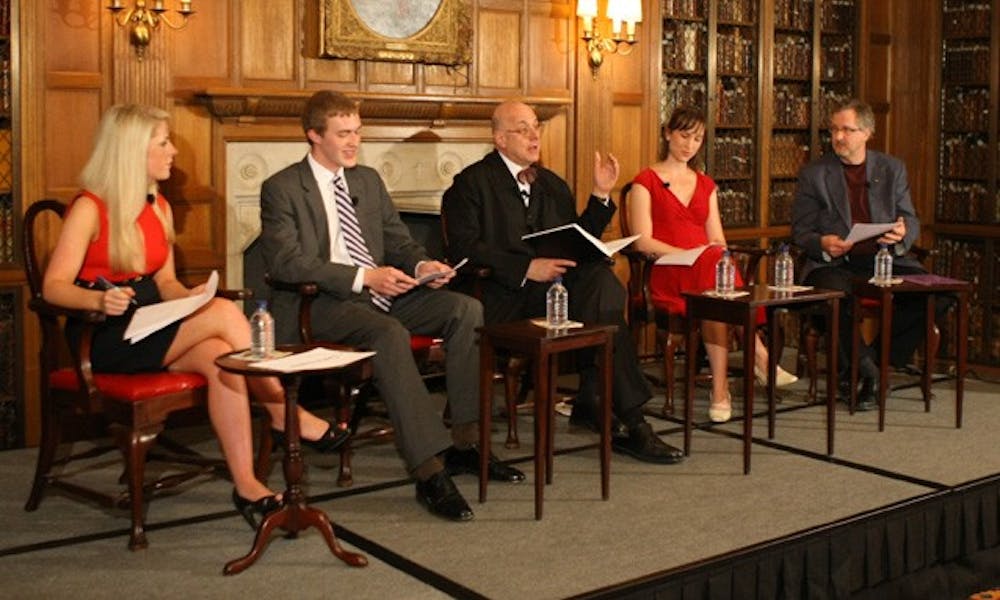American students are entering the adult world without morals, self-discipline and maturity—all because of modern education, said Bard College President Leon Botstein.
Botstein spoke about the shortfalls of the education system in a panel discussion with Steve Nowicki, dean and vice provost for undergraduate education; junior Taylor Clarke; and seniors Erin Cloninger and Andrew Schreiber. Botstein was the first visiting scholar to participate in the Duke Colloquium, a new initiative developed to connect the humanities and the professional world.
Botstein emphasized America’s desperate need for educational reform. He said that undergraduate institutions should strive to instill integrity in their students that remains with them throughout their career, particularly in popular professions such as finance and engineering. Because high school and university students are so focused on their future achievements, he noted, they do not take the time to understand the values and morals that would lead to an ideal society.
“Many undergraduates go to college with the understandable desire to pursue a profession in medicine, law and business,” he said. “What does higher education contribute to the redefinition of these professions?”
Botstein added that education in the United States is preventing students from having a global competitive edge, prompting Clarke to ask what American students are lacking today.
“What do we need to know in order to compete in the global workplace?” she asked.
Botstein listed several areas in which American students have room to improve, such as discipline, hard work and a sense of responsibility to the community. Many tend to be apathetic toward schoolwork and are getting too used to a “leisurely” and “painless” lifestyle, he added.
“Living without anxiety is the American disease with the notion that life is painless. There’s no aspirin for life, no Advil, and if it existed, it wears off,” he said, adding that he believes this almost explains why so many American students are involved with drug abuse.
Schreiber asked why Botstein has said in the past that he thinks many college students are immature. Botstein replied that because the current education model does not help students develop a moral compass, it prevents American youth from becoming sophisticated adults.
“American culture is an embarrassment and slightly hypocritical,” he said.
Bringing laughter to the discussion, Botstein proposed a radical change to high school education: graduation at age 16. He explained that children are maturing faster than ever before because of their social environment and improved health care, noting that the current graduation age of 18 is outdated.
“Eighteen years old today is the biological equivalent of 16 years old during the [Great] Depression, when education age was kept high to keep the young adults out of the workforce,” Botstein said.
Additionally, Botstein said that most of the last two years of high school are unnecessary, and students could spend that time doing something more productive such as an internship or service work. Senior Cloninger, however, argued that her high school’s Advanced Placement program was enriching and effective.
“AP is a fraud,” Botstein replied, noting that AP students focus so much on high test scores that they are unable to fully grasp the subject beyond simple fact memorization and exam preparation. “Colleges don’t accept AP credits because we see it as a way of students showing how smart they are.”
Botstein called on Duke students to be pioneers for education reform, both as policy makers and instructors. He hopes that Duke students will look beyond prestige and potential salary and become public school teachers.
“In the senior class of this fabulous university, I wager that the minority of the graduates want to make a career in the public classrooms below university level,” said Botstein. “The best people are not in teaching, and we are not recruiting them.”
Botstein concluded by noting that higher educational institutions and politicians have a responsibility to develop solutions that incentivize students to become teachers so that they can implement positive education reform, adding that the programs currently in place are just a start.
Get The Chronicle straight to your inbox
Signup for our weekly newsletter. Cancel at any time.

